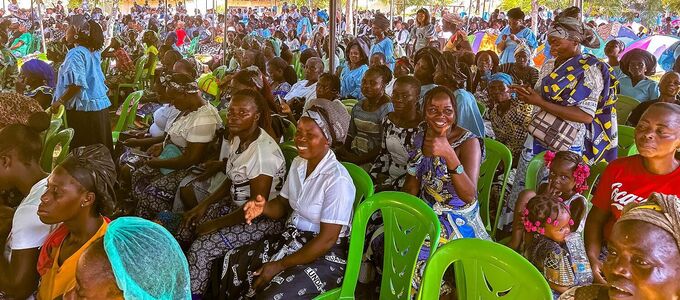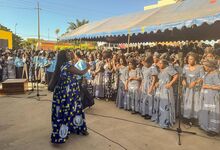Mothers in faith
In Angola, a woman becomes a mama by her mid-30s at the latest—even if she has no children. Because then she can take part in the activities of the Groupe des Mamas.

Without mamas congregational life in Angola is unthinkable. Mamas are the foundation on which the structure of the New Apostolic Church in Angola is built.
Maria Teresa has been a member of the New Apostolic Church since it was founded in Angola. Today, she is the coordinator of the Groupe des Mamas. Her team compares her to the women in the early Christian church.
Mothering the congregations
There was Mary, the mother of Jesus, who sacrificed everything for her Son, believed in Him, and even stood by Him in death when His disciples hid in fear. There was also the wealthy Mary Magdalene. After Jesus drove demons out of her, she never left His side again and supported Him financially. Or Martha, with whose family Jesus felt so at home, maybe also because she was always worrying about Jesus and making sure that He felt comfortable. When her brother and provider died, it was she who trusted Jesus completely.
For women today this means that they organise the Church’s teaching programmes, form and lead choirs, visit members who are no longer able to attend church services, see to it that everything is set up for divine service, and stand at the door to welcome people to church.
Welcome to our community
Mamas include women who have either become mothers or have celebrated their thirty-fifth birthday, in other words, are too old for the youth group and belong to the adult group. Every two months, they meet with other mamas from the district to talk about their faith and how to assert themselves in their own families, their congregation, and in society.
The mamas meet with all the other women in their Bishop area four times a year to prepare themselves for the constant challenges of daily life. Twice a year there is also a meeting of the mamas at the Apostle Area level and once a year at the national level, that is, for all of Angola.
The meetings are co-ordinated by Sister Maria Teresa, “whereby I follow the guidelines of our District Apostle Helper João Uanuque Misselo”, she says. He sets out the themes, commissions speakers, and trains them.
Staying healthy
One of Maria Teresa’s favourite topics is preventive healthcare. Although the public healthcare system in Angola is free, it is severely underfunded and understaffed as only a small proportion of government spending is channelled into the health sector. The country is also struggling with diseases such as HIV/AIDS, haemorrhagic fever, malaria, typhoid, tuberculosis, cholera, hepatitis, and other waterborne diseases.
Maria Teresa strictly adheres to the government’s guidelines on certain precautionary measures in the fight against diseases, such as the fight against Covid. She is predestined for the topic because she has a degree in public health. “I use my knowledge to help with preventive healthcare.”
Supporting one another
Maria Teresa is a Bantu. The term Bantu refers to around 400 different ethnic groups from Central and East Africa as well as southern Africa. “Based on our Bantu system, society is matriarchal, that is, women found families,” explains Maria Teresa. “However, we always respect the father figure as the provider,” she says.
The men, on the other hand, accept the women and enjoy the commitment of the mamas in the Church. “The men not only respect us, but also support us in all our activities.”
Supported and valued
And they are very grateful to the women and their efforts. This is why District Apostle Rainer Storck conducted a divine service for the women during one of his last trips to Angola in mid March, in which he expressed his special thanks to them.
Maria Teresa is proud to be a mama: “We all know that women are among the beings to whom God has entrusted a great task, namely to generate life.”
Article info
Author:
Date:
Keywords:
Katrin Löwen
23.07.2024
Angola,
Social commitment,
Congregational life,
People/Personalities





